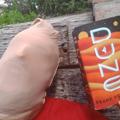La tercera parte de este clásico imprescindible
4 stars
Tras más de 500 años tras la creación del plan Sheldon, una nueva crisis Sheldon, una crisis donde las diferentes fuerzas de la galaxia se resitúan para seguir vivas y mantener su parcela de poder y donde la primera (y la primera y segunda fundación son las dos grandes potencias del plan, pese a llevar ya 8 crisis Sheldon), amenaza la galaxia: hay una fuerza desconocida que maneja el destino de la galaxia. Nadie quiere ser controlado. A nadie le gusta saber que su destino está predeterminado y el ser humano parece, por naturaleza, programado para luchar contra cualquier fuerza que se presente para dominar su destino. Golan Trevize así lo piensa y pretende desenmascarar a esa fuerza que se creía eliminada, pero que el sabe que existe: la segunda fundación. Para ello contará con la ayuda de un historiador experto en la cultura popular galáctica sobre el planeta más …
Tras más de 500 años tras la creación del plan Sheldon, una nueva crisis Sheldon, una crisis donde las diferentes fuerzas de la galaxia se resitúan para seguir vivas y mantener su parcela de poder y donde la primera (y la primera y segunda fundación son las dos grandes potencias del plan, pese a llevar ya 8 crisis Sheldon), amenaza la galaxia: hay una fuerza desconocida que maneja el destino de la galaxia. Nadie quiere ser controlado. A nadie le gusta saber que su destino está predeterminado y el ser humano parece, por naturaleza, programado para luchar contra cualquier fuerza que se presente para dominar su destino. Golan Trevize así lo piensa y pretende desenmascarar a esa fuerza que se creía eliminada, pero que el sabe que existe: la segunda fundación. Para ello contará con la ayuda de un historiador experto en la cultura popular galáctica sobre el planeta más antiguo que jamás a existido, del cual provienen todos los humanos que habitan la galaxia: La Tierra. De nombre Janov Perolat, y de carácter opuesto a Trevize, buscará la fuente más inmensa de conocimiento de toda la galaxia: la biblioteca de Trantor, la antigua capital del antiguo Imperio Galáctico. Ambos, obligados, chantajeados y entrampados por la hábil y audaz alcaldesa de la capital de La Fundación, Harla Branno, emprenderán la búsqueda de la segunda fundación y de la tierra embarcados en la más avanzada de las naves jamás construidas por La fundación.
Por su parte Stor Gendibal, un prometedor psicohistoriador de la segunda fundación, avezado como todos los miembros de esta elitista y diminuta organización en el arte de la predicción, manipulación mental y adivinaciones variadas, percibe que algo en el plan Sheldon no marcha bien. Una fuerza no identificada está manipulándolo, para encauzarlo por el lado correcto, pero es una fuerza que no pertenece, ni a la primera, ni a la segunda fundación ¿Qué podrá ser? Sura Novi, una campesina de Trantor, un mundo ahora transformado en un mundo agrícola y que es sede de la biblioteca más grande de la galaxia y de la segunda fundación, sorprenderá a Gendibal al derrotar a cuatro campesinos que querían destruirle y por la perfección de su mente. Gendibal es designado por el consejo de la segunda fundación para investigar la naturaleza de esta perturbación, no sin sufrir los ataques del mismo. Se embarcará con Novi hacia el sistema de Sayshell. Curiosamente es la misma dirección que, aparentemente sin sentido alguno, han tomado Trevize y Perolat ¿No iban a buscar pistas sobre la tierra y la segunda fundación en la biblioteca de Trantor? ¿Qué hay en el sistema de Sayshell que pueda unir a ambos grupos? Es más ¿Por qué el sistema de Sayshell lleva siendo independiente desde el Imperio Galáctico y no ha sido anexionado nunca? El mulo nació allí ¡Y no es la única sorpresa de este misterioso sistema! Gaia, un planeta oscuro y desconocido, ha tomado una decisión y Blissenobiarella y Novi se encargarán de hacérselo saber a la galaxia. Incluida la alcaldesa Branno.










